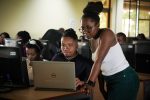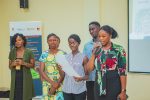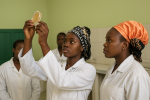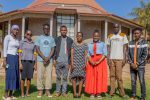Transformative Higher Education in Cameroon: Meeting Development Challenges
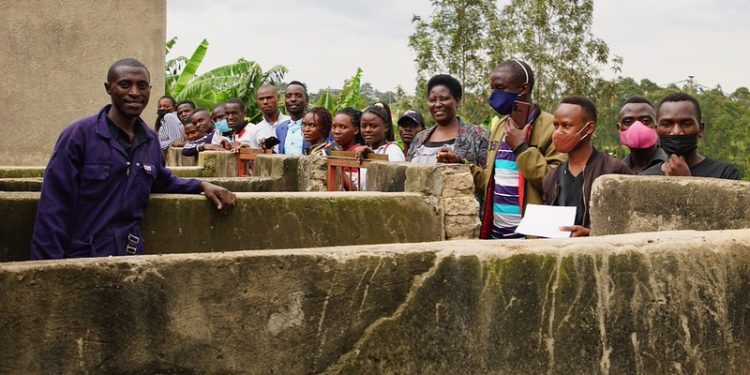
1Prof. Theresia Nkuo-Akenji, Vice-Chancellor, & 2Prof. Emmanuel Suh, Deputy Vice-Chancellor, Teaching, Professionalization and Development of Information and Communication Technology.
The University of Bamenda. P.O. Box 39 Bambili, North West Region, Cameroon
Introduction
The development challenges faced by Cameroon resonate with those of many African nations. In the context of the knowledge economy, universities are increasingly expected to address pressing societal and community needs. There is a growing recognition of this expectation, fueled by a shift away from paradigms established during the colonial and immediate post-colonial periods. In Cameroon, this transition has been significantly influenced by the enactment of the Law on the Orientation of Higher Education in 2023. This legislation advocates for the emergence of the entrepreneurial university, emphasizing the importance of research and content delivery that responds to community needs, enhances quality of life, and reduces reliance on imported goods. This law consolidates the transformative agenda that public universities in the country have already begun to pursue.
Prioritizing Youth Aspirations
Young people constitute the majority demographic in Cameroon, and the student body in tertiary education largely reflects this group. Therefore, any design for transformative education must align with the aspirations of these youth. Actions aimed at enhancing student development are integral to the systemic changes being implemented. Universities are equipping students with essential 21st-century skills, including leadership, peacebuilding, mutual respect, and coexistence. Furthermore, the integration of Information and Communication Technology (ICT) tools into learning, design, commercialization, and modeling is now a requirement for all students, regardless of their field of study. The orientation manuals developed by the TAGDev 2.0 Program on these soft skills further amplify this trend across universities partnering with the University of Bamenda (UBa).
In the past two years, UBa has adopted a problem-based learning approach, particularly for final-year research and capstone projects, thereby enhancing experiential learning and fostering community engagement. To optimize student performance, transformative education also necessitates improvements in student welfare and campus life. Initiatives such as health insurance, enhanced healthcare services through university health centers, and subsidized meals in university cafeterias support learners. However, accommodation remains a challenge, prompting public universities to explore partnerships with the private sector to expand on-campus housing options.
Strengthening Institutional Governance
Transformative education in Cameroon also involves strengthening institutional governance to enhance accountability within universities. The establishment of three Deputy Vice-Chancellor positions across all public universities has streamlined decision-making processes and encouraged consultation and engagement with all institutional stakeholders. Notably, the institutionalization of monitoring, evaluation, and learning (MEL) tools facilitates improved planning and timely adjustments, ultimately reducing financial losses and aligning budgets with available resources. Additionally, universities are increasingly generating revenue through various business ventures; for instance, the University of Buea operates a microfinance institution, while the University of Dschang has established a cooperative society. Such economic activities facilitate the translation of research outputs into marketable products and ease graduates’ transition into the workforce.
Revamping Teaching and Learning Processes
Transformative education necessitates reimagining teaching and learning processes and fostering stakeholder participation in curriculum reviews. Traditional models where the teacher is the sole authority must evolve into collaborative environments where teachers guide and learners actively engage. The adoption of the Bachelor-Master-Doctorate scheme has shifted focus towards a student-centered approach. Currently, approximately 30% of the curriculum at UBa is delivered online via its dedicated Learning Management System (LMS), which has increased enrollment in certain programs and enabled the use of online laboratories and simulations from partner institutions. These advancements require staff retraining and the establishment of robust industrial partnerships to enhance experiential learning, initiatives that public universities in Cameroon are actively pursuing. For example, a recent course on data analysis using R attracted significant interest from postgraduate students, reflecting a growing enthusiasm for digital tools in education.
Promoting Campus Internationalization
Campus internationalization is another critical component of transformative education embraced by public universities in Cameroon. Credit mobility and transferability are essential for enhancing internationalization efforts. All public universities participate in the Pan African Quality Assurance Alliance (PAQAA), with some engaging through CAMES and others through the AAU, ensuring their credit systems facilitate comparability. This engagement invites external evaluations that improve institutional performance and competitiveness. The implications are significant, as clearly defined learning outcomes translate into measurable skills. Increased diversity in the student population fosters cross-cultural learning experiences. For instance, the Universities of Maroua and Ngaoundéré host substantial foreign student populations from neighboring Chad and the Central African Republic, who pay the same registration fees as local students. Additionally, UBa hosts PhD students from South Sudan under the RUFORUM GTA scheme, benefiting from tuition waivers.
A potential barrier to internationalization is the language barrier. To address this, UBa has established a Language Centre to assist foreign students with language challenges, exemplifying efforts to foster robust international exchanges and partnerships.
Ensuring Inclusivity in Higher Education
A pertinent question arises: Has higher education always been accessible to all? In Cameroon, as in many other nations, certain segments of the population—such as internally displaced persons, refugees, individuals with disabilities, and those from marginalized backgrounds—are often inadvertently excluded from higher education. Thus, true transformative education must be inclusive and provide safeguards for these underserved groups. Prime Ministerial directives exist to support these individuals’ access to universities. While universities waive fees for qualified individuals, there is a pressing need for more intentional efforts to promote inclusion and safeguard vulnerable populations on campuses. Collaborating with the Cameroon Baptist Convention as a technical partner, UBa has initiated programs to raise awareness among university staff regarding the needs of these individuals. Supported by the TAGDev 2.0 Program, this campaign for inclusion has extended to private higher education institutions under UBa’s mentorship. Notably, a recent workshop attracted over 40 students with disabilities, several of whom applied for the inaugural cohort of TAGDev 2.0 scholarships. Furthermore, partnerships between UBa and organizations like the Cameroon Muslim Development Association aim to enhance training in Islamic banking and engage with small farmers from this demographic.
Empowering Graduates for Employment
The primary purpose of higher education is to equip young people with the skills necessary for employment or entrepreneurship. In Cameroon, the Ministry of Higher Education has developed a policy to guide universities in fostering entrepreneurial skills among students through the “One Student, One Enterprise” initiative. This framework encourages universities to establish business incubators on campuses and provide seed grants to promising ventures. However, successful implementation requires third-party funding, which poses challenges. Additionally, recovering funds advanced to graduates has proven problematic. All universities participate in annual student talent competitions, showcasing the best projects and business ideas, which has sparked increased student enthusiasm and interest from agencies such as the Cameroon Standards Board (ANOR), which has partnered with universities to ensure quality control of research projects for broader market access.
Bridging the Gap Between Higher Education and TVET
Transformative education must be relevant to the realities of its environment and beyond. The research and development agendas of Cameroonian universities call for community engagement, facilitating dialogue with Technical and Vocational Education and Training (TVET) institutions, which are vital for skill development and youth employment. Historically, there has been a disconnect between higher education institutions (HEIs) and TVETs; however, initiatives like the TAGDev 2.0 Program are bridging this gap. This collaboration is crucial, as certain incubators are funded by the ministerial department responsible for vocational training, creating a mutually beneficial scenario. Moreover, partnerships with private higher education institutes (PHEIs), which often possess well-established incubators and efficient management systems, are being pursued by UBa as it mentors over 51 PHEIs, thereby extending the benefits of transformative education.
Engaging out-of-school youth and alumni bodies is essential for realizing the potential benefits of collaboration with these groups. Recognizing this need, UBa’s Academic Organ has initiated programs for lifelong learning, which will be further developed through the TAGDev 2.0 Program.
Conclusion
Transformative education in Cameroon is fostering a shift in mindset towards increased multi-stakeholder participation in the education of young people. This evolution renders higher education accountable to the nation’s development strategy, which prioritizes human capital development through universities. The transformative actions of these institutions also create synergies among ministerial departments, encouraging support for universities during this transitional phase. While challenges may persist, the momentum towards transformative education in Cameroon is irreversible. The speed and effectiveness of its implementation will ultimately depend on the commitment of university management. The University of Bamenda remains dedicated to this transformative agenda.
